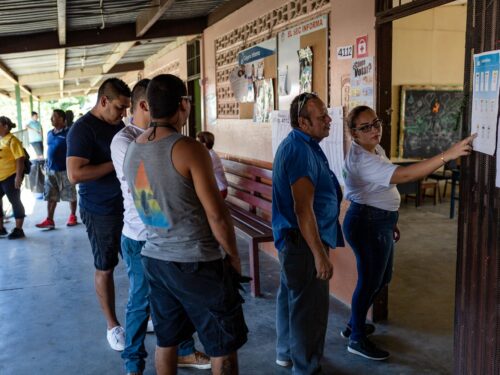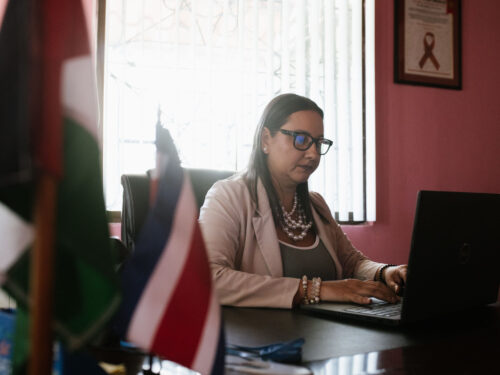
The mayor of Liberia, Luis Gerardo “Pipo” Castañeda, is leaving the new authorities who take office this Wednesday, May 1, a financial mess and more than ¢11 billion (about $21.5 million) in accounts receivables that need to be collected in areas such as providing services and municipal taxes.
Added to the list of “community liabilities” is the delay in priority projects to improve the quality of life of Liberia’s inhabitants. The president of the municipal council, Alejandro Morales, cited a municipal police force, a new landfill and a project with alternatives to decongest the road that connects the downtown area with the Daniel Oduber Quirós Airport (on route 21) as some of the most urgent.
For the next four years, lawyer José Javier Calvo, of the National Liberation Party, will govern the largest canton in Guanacaste and the one with the second largest budget, only surpassed by Santa Cruz. But in what state will he find the canton’s affairs?
The finances of the Municipality of Liberia remain at a disastrous level,” sums up the president of the council, Alejandro Morales, who holds Mayor Castañeda responsible for doing nothing to organize municipal finances as stipulated by accounting standards.
Vice Mayor Arianna Badilla agreed with him, who summarized it as “awful accounting management.” Council member Ricardo Quirós, of the Social Christian Republican Party, also agreed, describing the financial part of the local government as a “disaster.”
The Voice of Guanacaste requested an interview with Mayor Castañeda about the condition in which he will leave the municipality, but he declined to comment and requested the questions by email. Although the questions were sent to him, at the time of publication, there was no response.

Outgoing mayor, Luis Gerardo “Pipo” Castañeda, speaks during a municipal event at Mario Cañas Park during the celebration of Liberia’s 2022 cantonate.
An unsolved problem
The weaknesses in the Municipality of Liberia’s financial management have been going on for so many years that it isn’t even possible to pinpoint a date. It was not an unknown issue for Castañeda, who had also governed the municipality between 2011 and 2016.
Vice Mayor Badilla affirmed that this deficiency has been going on since 2014. And she added that there is still non-compliance on the part of the municipality in applying the accounting standards required by National Accounting and the Comptroller General of the Republic called IPSAS (International Public Sector Accounting Standards).
A report presented to the council by municipal accountant Lidieth Alvarado in August of 2022 acknowledged that they have not had financial statements since 2018.
Likewise, a note from National Accounting addressed to the municipal council on March 20 details that the Municipality of Liberia has never presented complete and correct financial statements to that entity.
The only time they sent information was in September of 2022 and this corresponded to data from 2018, 2019 and 2020, but it was incomplete and did not meet the quality and requirements requested,” the document reads.
The problem was also evident in the report from the Comptroller General of the Republic on Financial Management in the Municipality of Liberia (DFOE-DL-IF-0004-2020) sent in July of 2020. The report indicates the absence of up-to-date records of accounting transactions, both in the system and in the accounting books, as well as the balance sheets from 2018 to 2020. As a result, there are no financial statements for those periods either.
Moreover, they don’t make bank reconciliations, they don’t have the updated value of the municipality’s assets nor information on accounts payable and depreciation of assets.
Although the problem came from previous administrations, the Comptroller’s Office issued seven orders to the municipal council, Mayor Castañeda, the internal auditor and other local government authorities to correct the weaknesses in accounting management and strengthen financial management.
When asked about compliance with what was ordered, the press office of the Comptroller General of the Republic reported that there are two of these directives still in the process of verification.
Once this process is concluded, the corresponding actions will be executed. In cases of determining non-compliance, it’s possible to open investigations and apply the corresponding penalty code if offenses are proven,” they explained.
Weakness in financial management is not a problem unique to the Municipality of Liberia. This was reflected in the Financial Management Capacity Index, prepared by the Comptroller’s Office in 2023.
In that measurement, the Municipality of Liberia, like five other local governments in the province of Guanacaste, was located at a basic level of the index (between 25% and 50% capacity to manage their finances). The municipalities of Nicoya and Santa Cruz, with budgets similar to that of Liberia, obtained the best rating with an intermediate level of management capacity (between 50% and 75%). Meanwhile, Abangares and Nandayure remained at the initial level (financial management capacity less than 25%).
According to the president of the Municipal Council of Liberia, Alejandro Morales, lack of clarity in accounting information directly affects Liberians since it prevents the local government from taking out loans and making agreements with other public entities to develop projects that would benefit people.
This becomes relevant in a local government where current income is absorbed by operating and administrative expenses, and there is little left to invest.
Vice Mayor Arianna Badilla believes that the accounting mess problem could not be addressed in this administration due to the lack of capacity of the people responsible.
The way to fix it, she said, is to hire an accountant with the knowledge of how a local government works. In addition, the DECSIS computer system that the municipality already has but hasn’t implemented urgently needs to be set up.
This system, according to Badilla, allows information to be integrated from all municipal departments and can generate financial statements “with a single click.”

Millions overdue
The other burning issue that the future mayor and the new municipal administration will receive is delinquency. This is the sum of the debts that Liberian residents have with the municipality for providing services or payment of taxes.
A report from the Municipal Planning Department, issued in July 2023, detailed that the amount accumulated by the year 2022 was ¢10,483,000,000 (about $20,555,000).
The amount increased to ¢11,143,000,000 (about $21,850,000) by the end of 2023, according to a document obtained by this news outlet. That means that last year closed with accounts receivables pending higher than the initial budget for 2024, established at ¢10,013,000,000 (about $19,633,000).
And that’s not all. According to the planning department’s analysis, the amount could be higher since part of the problem is that the figure is not refined and there is no certainty as to exactly how much these debts add up to.
“The review of the pending collections and the decisions to take the respective measures to clear that figure through the uncollectable debt account or other forms cannot continue to be postponed,” the report indicates.
The main debts that taxpayers owe to the local government come from municipal business licenses, real estate taxes, garbage collection and treatment service, cleaning and maintenance of parks and roads, use of the municipal cemetery and rentals of spaces in the market.
For example, in 2023, the local government should have received a total of ¢6,225,000,000 (about $12,205,000) for business permits, the item with the highest accumulated debts. That amount includes outstanding amounts from previous years and those from 2023. As of December 31, they had collected ¢2,151,000,000 (about $4,217,000), but ¢4,074,000,000 (about $7,988,000) remained pending payment, 65% of the amount placed in collections. (See box: Highest payments pending).
The Planning Department also points out that the actions taken by the municipality to lower accounts receivables are limited to publicity, publishing payment dates or purchasing vehicles for collection management, which is insufficient.
There is no recovery goal for delinquent payments. Even though the council has provided support with appointing external lawyers, they don’t monitor the work of these professionals. Furthermore, additional human resources have been assigned to that area and it remains the same,” commented the municipal president, Alejandro Morales.
The council member added that if collection improves, the municipality could “easily” reach ¢12 billion (about $23,530,000) in current income instead of the ¢7.5 billion ($14,705,000) that are set per year.








Comments